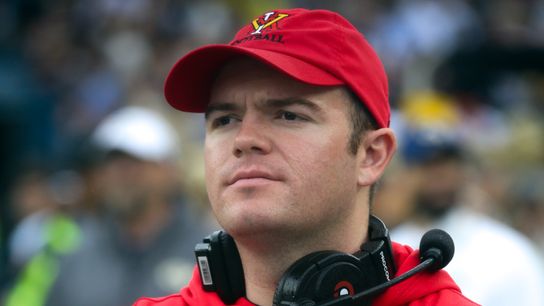Though early in his football operations career, Peter Capone has never shied away from a challenge.
That intrepid approach was a necessity nearly 12 months ago, when Capone departed his wide-ranging role with the Marist Red Foxes football program to become the first-ever, full-time director of football operations at VMI.
Capone was hired in mid-February 2024 as veteran coach Danny Rocco transitioned from Year 1 to Year 2 atop the Keydets program.
There was no time for easing into the role at the notoriously budget-strapped program in Lexington, Virginia, which stands as America’s first military college.
“It’s been a really great experience, because going to a school that hasn’t had experience with a (full-time) DFO, you learn what has worked and learn what needs to be implemented, I guess you would say,” said Capone, who roundly praised his experience with Rocco, who last decade had Richmond and Delaware as regular FCS Playoffs contenders.
Though Capone arrived as VMI was preparing for its spring camp, he had far bigger concerns. The Keydets had six away games during their 2024 season, five of them outside the Commonwealth.
“The big thing was that we were trying to get ready for spring ball, but we actually were playing catch-up for our team hotels,” Capone said. “I just really wanted to make sure we got everything we needed.
“A lot of that early time was getting to know the people here, the people on staff and people on post, which is campus. Getting to know the athletic administration staff, compliance director, head of business; those were big areas the first six weeks.”
The governmental component at VMI – the school’s mission to produce “citizen-soldiers” means there are trained reserves for the U.S. Air Force, Army and Navy – also adds new layers of work in Capone’s preparations for the football program.
Meticulous planning is a must.
“It’s kind of unique, in that you have to deal with a lot of (formal, government-type) authorization forms,” said Capone, “which means I need to be able to help coaches put in the forms to go on the road recruiting, help get the per diem rate set, get a rough estimate of what can be spent for gas.”
If Capone, as with the DFOs who fill myriad, oft-thankless roles around college football, nails down his advance successfully in the spring, he’s more able to settle into a daily routine during the grind of the regular season.
In his first autumn working under Rocco, Capone finds his arrival times stretch from 6 a.m., typically no later than 7, each day. VMI doesn’t fly for any of its Southern Conference games, so ensuring bus travel is aligned – and bills are paid – looms large.
“I want to be able to present team itinerary to staff, set up our police escort logistics, be in constant communication with the director of facilities and operations (on road trips), get with our business office for expenses,” said Capone, who stressed he embraced the routinely 12-hour days as he immersed himself in Rocco’s system. “You just want to try to fine-tune everything that you can, especially the calendars. We want to have our calendars worked out as far in advance as we can, because hotel rates are constantly changing and we have a government web site that dictates how much we can be spending on food, lodging, travel, etc.
“We can’t just go buy things from Walmart; it has to be through our vendors.”
But amidst the challenges, Capone finds camaraderie and growth in the spartan Keydets ecosystem.
“I would say it’s the people, I really would, because we’re all trying to work together and I’m very appreciative of the all-hands-on-deck approach,” said Capone, who not only handled DFO duties at Marist but also worked as the head equipment manager and video coordinator. “You find it’s important to be more responsive, more collaborative.
“Sometimes, people may think a military school is standoffish, but that’s not at all been my experience.”
Photo credit: Onier Vargas - VMI Athletics
